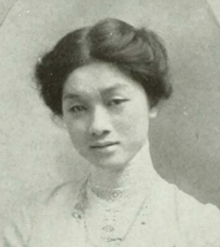Anna Kong Mei
 From Wikipedia the free encyclopedia
From Wikipedia the free encyclopedia
Anna Fojin Kong Mei (February 22, 1891 – February 24, 1958) was a Chinese-American social worker, clubwoman, writer, and educator. She was vice president of the Pan Pacific Women's Association, vice president of the World YWCA, and national president of the YWCA in China.
Early life and education[edit]
Anna Fo-jin Kong was born in Hong Kong. She graduated from McKinley High School in Honolulu in 1911,[1] attended the University of California for a year,[2][3] and graduated from Barnard College in 1915.[4] Later in life, she attended Berkeley Baptist Divinity School, to maintain student status for her visa while awaiting permanent resident status.[5]
Career[edit]
After college, Kong went back to China, where she taught at a girls' school. She was vice president of the World YWCA, and national president of the YWCA in China.[6][7] She was founder and president of the Shanghai Women's Club. Mei was vice president of the Pan Pacific Women's Association, and attended the Association's 1937 conference in Vancouver,[8][9] the timing of which prevented her return to China.[5]
In the United States again after 1942, she wrote a pamphlet of recipes, Chinese rice bowl: Chinese dishes in American kitchens (1943), taught citizenship classes,[6] and spoke about China to women's groups.[10][11][12] "A nation can only be as strong as its weakest part," she told an audience in Oakland in 1943, "and if its women are strong half the battle is won."[3]
Publications[edit]
- "The Physical Department of the Y. W. C. A." (1916)[13]
- "The Modern Chinese Woman: Her Work and Problems" (1924)[14]
- Chinese rice bowl: Chinese dishes in American kitchens (1943, pamphlet)[15]
Personal life[edit]
Anna Kong married attorney Hua-Chuen Mei in 1916, in China.[16] They lived in Shanghai for 23 years,[17] and had three children, Lincoln, Julia, and Elizabeth (Betty).[18] She returned to California as a wartime refugee,[19] while her husband was a prisoner of war, held by the Japanese in the Philippines.[20] She was granted permanent residence in the United States by an act of Congress in 1948,[5] and became a United States citizen in 1950. Her husband died in 1953,[21] and she died in 1958, at the age of 67, in Oakland, California.[22][23]
References[edit]
- ^ "High School Commencement". The Hawaiian Star. 1911-06-20. p. 5. Retrieved 2023-11-09 – via Newspapers.com.
- ^ "Anna Kong Mei Paints Vivid Word Picture of China; Tells Part Women Play in Country". Petaluma Argus-Courier. 1944-11-25. p. 2. Retrieved 2023-11-10 – via Newspapers.com.
- ^ a b "No Time to Hate, B. P. W. C. is Told". Oakland Tribune. 1943-10-15. p. 21. Retrieved 2023-11-10 – via Newspapers.com.
- ^ Barnard College, Mortarboard (1915 yearbook): 161.
- ^ a b c United States Congress, House (1947). Report. U.S. Government Printing Office.
- ^ a b "YWCA's World Fellowship Group Opens New Series". The Berkeley Gazette. 1951-09-19. p. 9. Retrieved 2023-11-10 – via Newspapers.com.
- ^ Mei, Anna Kong; Wong, Julia (July 1925). "Letter Sent to the Press by the Young Women's Christian Association". The Chinese Recorder. 56: 471–472.
- ^ "Mrs. Anna Kong Mei to Give Address on 'China Today'". The Berkeley Gazette. 1950-10-16. p. 8. Retrieved 2023-11-10 – via Newspapers.com.
- ^ "Anna Kong Mei Guest Speaker". Oakland Tribune. 1943-10-10. p. 41. Retrieved 2023-11-10 – via Newspapers.com.
- ^ "Chico Quota Club Officers Return from Twelfth District Conference on Quota's Role in War and Peace". Enterprise-Record. 1944-10-19. p. 4. Retrieved 2023-11-10 – via Newspapers.com.
- ^ "AAUW Branch to Hear Noted Chinese Women". Visalia Times-Delta. 1946-11-06. p. 5. Retrieved 2023-11-10 – via Newspapers.com.
- ^ "Methodist WSCS Holds Unique Chinese Luncheon". Porterville Recorder. 1947-04-19. p. 8. Retrieved 2023-11-10 – via Newspapers.com.
- ^ Mei, Anna Kong (June 1916). "The Physical Department of the Y. W. C. A." Woman's Work in the Far East. 37 (2): 69–72.
- ^ Mei, Anna Kong (October 1924). "The Modern Chinese Woman: Her Work and Problems". International Review of Missions. 13 (52): 565–572. doi:10.1111/j.1758-6631.1924.tb03917.x.
- ^ Mei, Anna Kong (1943). Chinese Rice Bowl: Chinese Dishes in American Kitchens. The Author.
- ^ "Personal News". The Chinese Students' Monthly. 11 (4): 295. February 1916.
- ^ "Anna Kong Mei Explains History of Hakka People". The Honolulu Advertiser. 1953-05-11. p. 13. Retrieved 2023-11-09 – via Newspapers.com.
- ^ "Yuke, Betty Mei". San Francisco Chronicle. 2004-02-15. Retrieved 2023-11-10.
- ^ "Entertain for Anna Kong Mei". The Register. 1941-06-05. p. 18. Retrieved 2023-11-10 – via Newspapers.com.
- ^ "Anna Kong Mei to Address Business Women". Visalia Times-Delta. 1944-10-09. pp. 1, 5. Retrieved 2023-11-10 – via Newspapers.com.
- ^ "Hua-Chuen Mei". The Times. 1953-02-25. p. 12. Retrieved 2023-11-10 – via Newspapers.com.
- ^ "Anna Kong Mei, Clubwoman, Dies". Honolulu Star-Bulletin. 1958-02-27. p. 4. Retrieved 2023-11-09 – via Newspapers.com.
- ^ "Marin Woman's Mother Dies". Daily Independent Journal. 1958-02-25. p. 4. Retrieved 2023-11-10 – via Newspapers.com.
External links[edit]
- Anna Fojin Kong Mei, at Jane Addams Digital Edition
